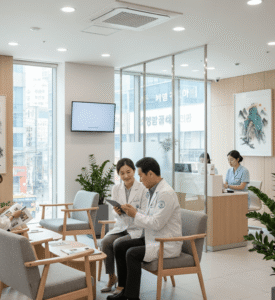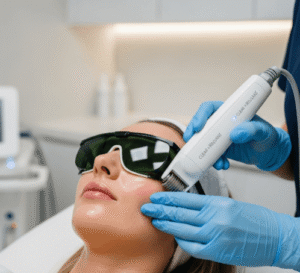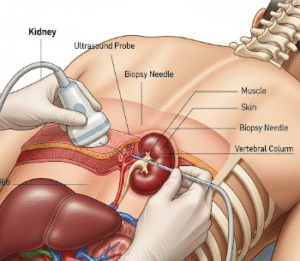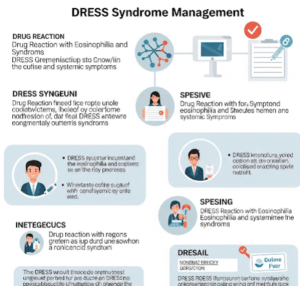What it is
Postpartum care refers to the physical, emotional, and medical support provided to mothers after childbirth, usually lasting six to eight weeks but often extending longer. This period, sometimes called the “fourth trimester,” is crucial for the mother’s recovery and bonding with the newborn.
In Korea, postpartum care has gained global recognition because of the unique Sanhujoriwon (postpartum care centers). These centers provide specialized recovery services such as balanced nutrition, body treatments, lactation support, and mental health care. Postpartum care in Korea is a holistic approach that combines modern medical practices with traditional recovery methods.
➡️ Key aspects of postpartum care include:
- Physical healing from childbirth (vaginal delivery or C-section)
- Nutritional support with carefully prepared meals
- Emotional support to prevent postpartum depression
- Infant care guidance for breastfeeding, hygiene, and bonding
Why it’s done
The postpartum period is often underestimated, but it is vital for the long-term health of both mother and baby.
✔️ Reasons postpartum care is essential:
- Mothers experience hormonal changes that may cause mood swings or depression
- Healing is required from delivery-related wounds, stitches, or surgical scars
- Adequate rest prevents complications such as uterine infections or hemorrhage
- Professional guidance ensures proper breastfeeding techniques and nutrition for both mother and baby
✔️ Benefits for mothers:
- Faster recovery from delivery trauma
- Prevention of long-term complications such as pelvic floor issues
- Mental well-being and reduced risk of postpartum depression
✔️ Benefits for babies:
- Healthy breastfeeding support
- Safe bonding environment with the mother
- Access to pediatric monitoring and early care guidance
Alternatives
While structured postpartum care centers are highly popular in Korea, there are alternatives depending on resources and personal preferences.
🔹 Home-based postpartum care:
- Family members provide rest, nutrition, and infant care support at home
- Traditional confinement practices (staying indoors, eating restorative foods)
🔹 Hospital-based recovery:
- Extended hospital stay after delivery with specialized medical monitoring
- Common for mothers with high-risk conditions
🔹 Self-managed care:
- Mothers handle their own recovery with guidance from occasional clinic visits
- Less structured but flexible depending on lifestyle
Preparation
Good preparation ensures a smoother postpartum period and prevents overwhelming stress.
➡️ Medical preparation:
- Discuss postpartum care options with the obstetrician before delivery
- Arrange necessary medical check-ups for both mother and baby
- Plan for potential health needs, such as wound care or lactation support
➡️ Personal preparation:
- Booking a Sanhujoriwon center in advance (many are fully booked months ahead in Korea)
- Preparing a home environment with necessary supplies (baby crib, diapers, comfortable clothing)
- Ensuring support from family or partner for daily chores and emotional care
➡️ Mental preparation:
- Understanding that postpartum recovery is not only physical but also emotional
- Attending prenatal classes to learn about newborn care and postpartum challenges
- Preparing for lifestyle adjustments, including sleep changes and dietary needs
How it’s done
Postpartum care in Korea is highly structured, especially in Sanhujoriwon centers, which offer programs lasting 2–4 weeks.
✔️ Step 1 – Immediate postpartum care
- Monitoring mother’s vital signs and uterine contraction
- Pain management after vaginal delivery or C-section
- Supporting first breastfeeding attempts within hours of delivery
✔️ Step 2 – Physical recovery support
- Gentle body massages and warm therapies to promote blood circulation
- Nutrient-rich meals with traditional Korean dishes like seaweed soup (Miyeok-guk) for iron and calcium
- Daily rest schedules to ensure proper healing
✔️ Step 3 – Emotional support
- Counseling services to detect and prevent postpartum depression
- Relaxation therapies such as meditation or aromatherapy in some centers
- Support groups with other mothers for shared experiences
✔️ Step 4 – Infant care education
- Professional guidance on breastfeeding positions and latch techniques
- Baby bathing, diapering, and safe sleep practices
- Monitoring infant growth, feeding schedules, and early health indicators
✔️ Step 5 – Transition to home care
- Gradual preparation for returning home after the center stay
- Providing written instructions and resources for ongoing recovery
- Continued access to hotline or outpatient visits if needed
Recovery
The recovery period after childbirth can last several weeks or months, depending on the type of delivery and the mother’s health.
➡️ Physical recovery:
- Vaginal delivery: 4–6 weeks for complete healing
- C-section: 6–8 weeks with incision care
- Common experiences include bleeding (lochia), fatigue, and breast tenderness
➡️ Emotional recovery:
- Hormonal fluctuations may cause mood swings
- Support systems help reduce anxiety and depression risks
- Counseling is available in Korean centers for emotional well-being
➡️ Key recommendations for recovery:
- Adequate rest and proper nutrition
- Light physical activity like walking once approved by the doctor
- Hydration to support milk production
- Attending postpartum check-ups to track healing progress
Treatment option in Korea
Korea is renowned for its advanced and culturally unique postpartum care system, blending medical expertise with traditional practices.
✔️ Sanhujoriwon (postpartum care centers):
- Provide hotel-like accommodations with private rooms
- Offer daily meals, recovery therapies, and infant care support
- Staffed with nurses, lactation consultants, and dietitians
✔️ Hospital-linked centers:
- Located within or near hospitals for quick medical access
- Beneficial for mothers with high-risk deliveries
✔️ Cultural significance:
- Korean tradition emphasizes the “three weeks of rest” rule
- Mothers avoid cold exposure, focus on warm foods, and limit strenuous activities
- Postpartum recovery is treated as an investment in long-term health
✔️ Highlight: Postpartum care in Korea ensures comprehensive recovery with medical, nutritional, emotional, and cultural support, helping mothers transition smoothly into motherhood while ensuring the baby’s health and well-being.













